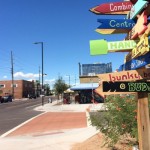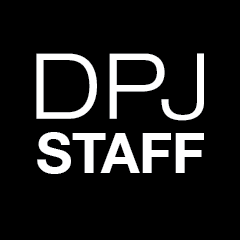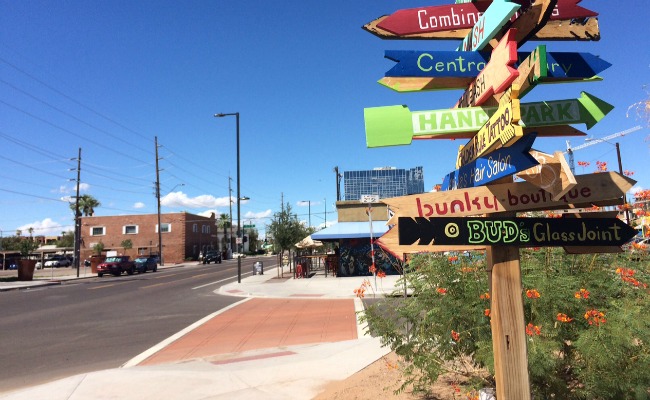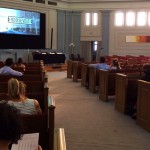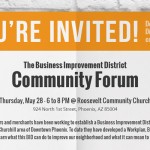Where do property owners fit into the urban paradigm?
For decades, downtown property owners have had a front-and-center role in the development of downtown Phoenix. These are the pioneers who invested varying degrees of time, money, and energy into our core at a time when downtown was passed over by those who preferred to invest in the sprawling outskirts of our city.
Whether it’s a commercial property or a single family home, putting one’s stake or golden groundbreaking shovel into terra firma carries special meaning. However, the purchase is only the beginning.
A significant portion of downtown development has occurred at a time of rising equity, but we now know that a community doesn’t really take shape until there is an investment of sweat equity. The historic residential Roosevelt and Garfield neighborhoods know this all too well. Now, this investment has led to the Roosevelt Row/Evans Churchill neighborhood’s proposal of an Enhanced Municipal Services District (or Business Improvement District, a “BID”).
Developing Downtown Businesses and a Community
Phoenix once had a dense downtown. After decades of sprawl, we better understand the value of offices, restaurants and retail located in close proximity, and we want that again. We want districts where business owners can make a living and property owners get a return on their investment in thriving neighborhoods (“location, location, location”), while keeping an eye on affordability.
These dense urban environments have developed in specific areas of downtown. One is in the central core. The 90 square blocks of downtown have been a focus of a BID corporation called Downtown Phoenix Inc. (née Partnership) for approximately 25 years. There is no denying that the BID is helping bring this much-desired density to our central core. Even CityScape, a microcosm of an urban commercial district, would not have been possible without the Downtown BID.
Not all businesses in urban areas are successful of course, but the increase of traffic and customers in these walkable areas certainly provides an opportunity to be successful. And successful businesses make for more successful property owners.
So beyond developing a customer base, how do businesses operate? How do each of these individual businesses, and business owners, function in this environment?
They share.
Yes, these bottom-line minded business owners find efficiencies and share where it makes economic sense.
Sharing sounds more like a preschool lesson that a business strategy, but parking is a great example of how sharing makes good business sense; there is simply no way a single small business in a dense urban environment would build a parking garage for its own customers, nor would they want to.
So what are the key elements that make a sharing strategy successful? Contribution and communication. If property owners and businesses don’t contribute and communicate in this sharing, give-and-take situation, then they’re likely just…taking.
Rowing Together
Take Roosevelt Row, but don’t take it for granted. Is there a district that is more reflective of a mix of property and business owners that have collectively brought it to national recognition? These property owners are also business owners, artists, and ultimately, caretakers and stewards of an area that significantly contributes to our city’s economy, culture and image.
They have done so much, but there is so much more to do. And times are changing.
Success can make things complicated. The future development of the district is being questioned by seemingly all parties: property owners, business owners, and community advocates who own nothing but a sense of responsibility to give back to the neighborhood that’s given so much. Even City leaders are cautiously observing what’s taking place here and navigating carefully through RFPs, streetscape plans, and more, so as not to disturb the delicate balance of what has been created here.
People have worked together in Roosevelt Row, and in the Evans Churchill neighborhood, and have relied on each other to build a dense, urban environment. They’ve worked hard to bring resources together and to communicate the details and benefits of the BID with their community.
We’ve heard the issues raised by some property owners. We’ve heard people question the idea of paying more taxes when taxes on downtown commercial properties are already high. We’ve heard that they weren’t told this was happening.
We’ve listened. But we wonder if they have.
Some have claimed that the countless meetings held, and communications sent, by Roosevelt Row CDC, Evans Churchill Community Association, Roosevelt Action Association, Downtown Voices, Downtown Phoenix Inc. City of Phoenix, and the BID Working Group itself were not enough.
As a property owner in a rapidly changing urban environment, we have a responsibility to tune in and be informed. The claim of we “weren’t told” for an 18-month long process is difficult to witness. Ignorance is nearly impossible in downtown, unless the choice is made to ignore.
And the idea of more taxes? If only we could decide how all our tax payments were going to be spent in our own neighborhood. The opportunity to sit at the table and identify neighborhood needs and priorities – and potentially develop district parking solutions, fund regular street cleaning, and maybe even advocate for lower commercial property taxes – will only be aided by the creation of an organization structure that is designed to produce efficient, collaborative processes.
Disagree with the proposal? Everyone has that right. But before anyone takes that position, they may want to first consider the investment of time and energy that Roosevelt Row volunteers have made over the years. Or think about how these efforts helped bring customers and raise property values.
We all need to take responsibility for our part of the communication and contribute, in both dialogue and investment, to make this valuable, dense, downtown work.
A successful Roosevelt BID would help guide the dialogue and investment, so that it’s put to best and highest use for the lasting benefit of the property owners, the business owners, and the community members who’ve invested sweat equity over the years.
Phoenix City Council Meeting
When: Wednesday, January 20, 2:30 p.m.
Where: Phoenix City Council Chambers, 200 W. Jefferson St.
Jill Bernstein, Courtney McCune and Catrina Kahler* contributed to this article.
*Kahler is a downtown property owner owns Urban Affair LLC, a company that was contracted by the BID working group’s consultant to provide admin support and workshop management assistance. Kahler donated her time and was not personally compensated.


